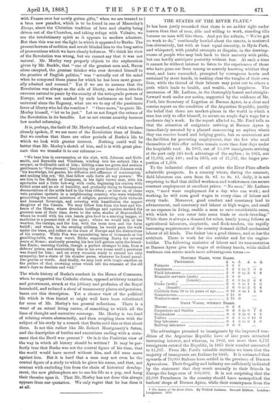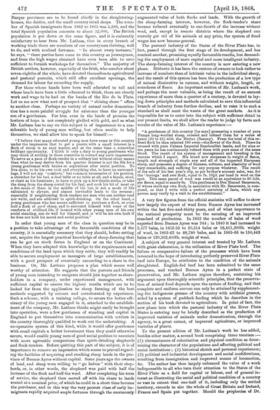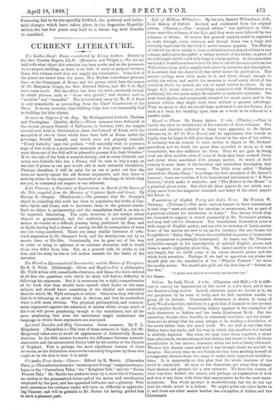THE STATES OF THE RIVER PLATE.*
IT has been justly remarked that there is no sadder sight under heaven than that of men, able and willing to work, standing idle because no man will hire them. And yet the refrain, " We've got no work to do," continually bawled about the streets, is muttered less obtrusively, but with at least equal sincerity, in Hyde Park, and whispered, with painful attempts at disguise, in the drawing- rooms of people who may look back to their ancestry with pride, but can hardly anticipate posterity without fear. At such a time it cannot be without interest to listen to the experiences of those who have gone out from among us scarcely knoWing whither they went, and have succeeded, prompted by courageous hearts and sustained by stout hands, in making clear the tangles of their own lives, while the thread of their labours may point out to others a path which leads to health, and wealth, and happiness. The assurances of Mr. Latham, in the thoroughly honest and straight- forward work under our notice, supported by the evidence of Mr. Ford, late Secretary of Legation at Buenos Ayres, in a clear and concise report on the condition of the Argentine Republic, justify the belief that there are market-places in the world iu which a man has only to offer himself, to secure an ample day's wage for a moderate day's work. In the report alluded to, Mr. Ford tells us that the attention of emigrants arriving at Buenos Ayres is immediately arrested by a placard announcing an asylum where they can receive board and lodging gratis, but so convenient are thelacilities for procuring employment, that the few who avail themselves of this offer seldom remain more than four days under the hospitable roof. In 1863, out of 10,408 immigrants arriving at the port only 545 took advantage of the asylum ; in 1864, out of 11,682, only 440 ; and in 1865, out of 11,767, the larger pro- portion of 1,300.
To the industrial classes of all grades the River Plate affords admirable prospects. In a country where, during the summer, field labourers can earn from 6s. 8d. to 8s. 4d. daily, it is not surprising to find that skilled workmen and workwomen can secure constant employment at excellent prices. " No man," Mr. Latham says, " need want employment for a day who can work ; and working, he will earn good wages in every class of labour and every trade. Moreover, good conduct and constancy lead to advancement, and constancy and labour at high wages, and small or no expense in living, enable a man to save considerable sums, with which he can enter into some trade or stock-breeding." While there is always a demand for sober, handy young fellows as agricultural labourers, shepherds, and flock-tenders, the rapidly increasing requirements of the country demand skilled mechanical labour of all kinds. The tinker has a good chance, and so has the architect. There is work for the cobbler and for the engine- builder. The following statistics of labour and its remuneration at Buenos Ayres give the wages of ordinary hands, while skilled workmen can secure much more advantageous terms :— Meninx WAGES, WTYR BOARD.
PROFESSION.
£ S.
d. £ s. d.
Farmers 3 6 8
Gardeners 4 2 6 to 5 0 0 Field labourers 2 8 0 to 3 6 8 Domestic servants (male) 2 8 0
„ (female)
2 0 0 to 3 6 8 Cooks (male) 3 6 8 to 4 2 6 „ (female) 2 6 0 to 3 6 8 Children from 10 to 15 years of age 0 16 8 to 1 5 0 Seamstresses 2 18 0
Washerwomen 2 18
0
DAILY WAGES, WITHOUT BOARD.
Masons 0 6 8
Carpenters and Smiths 0 6 8 to 0 7 8 Shoemakers 0 6 8 to 0 8 4 Tailors 0 6 8 to 0 10 0 Day labourers 0 4 0 to 0 5 0 Railway labourers
0 6
8
The advantages promised to immigrants by the improved con- dition of the Argentine Republic have of late years attracted increasing interest, and whereas, in 1862, not more than 6,717 immigrants entered the Republic, in 1865 their number amounted to 11,767. From Mr. Ford's valuable statistics we learn that the majority of immigrants are Italians by birth. It is estimated that upwards of 70,000 Italians have settled in the province of Buenos Ayres alone. Their frugality and industry are sufficiently indicated by the statement that they remit annually to their friends in Europe the large sum of 100,0001. It is not surprising that the 25,000 Frenchmen in the country should have monopolized the barbers' shops of Buenos Ayres, while their countrymen from the
* The States of the Riser Plate. By Wilfrid Latham. Second Edition. London : Longman. 1868.
Basque provinces are to be found chiefly in the slaughtering- houses, the dairies, and the small country retail shops. The num- ber of Spanish immigrants from 1862 to 1865 was 5,583, and the total Spanish population amounts to about 32,000, The British population is put down at the same figure, and it is eminently satisfactory to hear from Mr. Latham, that in every branch of working trade there are numbers of our countrymen thriving, well to do, and with realized fortunes. " In almost every instance," he says, " these parties have come to this country as journeymen, and from the high wages obtained have soon been able to save sufficient to furnish workshops for themselves." The majority of British settlers, however, especially of the Irish, who number about seven-eighths of the whole, have devoted themselves to agricultural and pastoral pursuits, which still offer excellent openings, the demand for labour far exceeding the supply.
For those whose hands have been well educated to toil and whose heads have been a little educated to think, there are clearly work and wage to be had on the banks of the Rio de la Plata. Let us see now what sort of prospect that " shining shore" offers to another class. Perhaps no variety of animal under domestica-
tion has a more painful struggle for existence than the younger son of a gentleman. For him even in the lands of promise the horizon of hope is not completely girdled with gold, and as what Mr. Latham has to say on this subject is of importance to a con- siderable body of young men willing, but often unable to help themselves, we shall allow him to speak for himself :—
" I believe that many educated young men have come to this country under the impression that to get a puesto with a small interest in a flock of sheep is an easy matter, and at the same time a somewhat brilliant opportunity. I think it only a duty to young gentlemen who may think of settling in these countries to correct any such impression. To serve as a peon or flock-tender in a solitary but without other means than what he may derive from his quarter interest is not the life for a young gentleman with brains or aspirations after social position. To live alone, to be his own cook and everything else, to have no surround- ings, I will not say `comforts,' but common necessaries of his position, a stretcher for his bed, a deal table or no table at all, and a bench, stool, or chair as his furniture ; to have to pick up a few thistle-stalks, or take the dung from the sheep corral for his fuel, and cook his bit of meat on a fire made of these in the middle of his but, is not a mode of life calculated to elevate, and almost inevitably leads to the reverse ; especially if neighbouring flock-tenders are men who can neither read nor write, and are addicted to spirit-drinking. On the other hand, a young gentleman who has means sufficient to purchase a flock, or even half a flock of good sheep, and to surround himself with some of the comforts of civilized life, if located with other young men of his own social standing, can do well for himself, and it will be his own fault if he does not hold his moral and social position."
In order that young men of the class in question may be in a position to take advantage of the favourable conditions of the country, it is essentially necessary that they should, before setting out, acquire the largest practical knowledge of sheep-farming that can be got on stock farms in England or on the Continent.
When they have adapted this knowledge to the requirements and conditions of the land upon which they settle, they will readily be able to secure employment as managers of large establishments, with a good prospect of eventually succeeding to a share in the business. Or, Mr. Latham proposes a plan which seems well worthy of attention. He suggests that the parents and friends of young men intending to emigrate should join together as share- holders in a company, under experienced management, with sufficient capital to ensure the highest results which are to be looked for from the application to sheep farming of the best methods suggested by science and corroborated by experience. Such a scheme, with a training college, to secure the better effi- ciency of the young men engaged in it, attached to the establish- ment of the company, Mr. Latham thinks might easily be brought into operation, were a few gentlemen of standing and capital in England to put themselves into communication with settlers in the country thoroughly qualified to work out the undertaking. A co-operative system of this kind, while it would offer gentlemen with small capitals a better investment than they could otherwise secure, would enable young men of good social position to associate with more agreeable companions than spirit-drinking shepherds and flock-tenders. Before quitting this part of the subject, it is of importance to remove an impression which seems to prevail regard- ing the facilities of acquiring and stocking sheep lands in the pro- vince of Buenos Ayres without capital. Some years ago the owners of land, and sheep were willing to " go halves " with their shep- herds, or, in other words, the shepherd was paid with half the increase of the flock and half the wool. After completing his term of service, the shepherd then moved off with his share to lands rented at a nominal price, of which he could in a short time become the purchaser, and in this way the very poorest class of early im- migrants rapidly acquired ample fortunes through the enormously augmented value of both flocks and lands. With the growth of the sheep-farming interest, however, the flock-tender's share became reduced eventually to one-fourth of the increase without wool, and, except in remote districts where the shepherd can scarcely get rid of his animals at any price, the system of fixed wages has now become general.
The pastoral industry of the States of the River Plate has, in fact, passed through the first stage of its development, and has reached another, promising equally favourable results, but demand- ing the employment of more capital and more intelligent industry..
The sheep-farming interest of the country is now entering a new phase. Hitherto it has been the custom of owners to look rather to increase of numbers than of intrinsic value in the individual sheep, and the result of this system has been the production of a low type of animal diminutive in carcase, and without weight, length, or soundness of fleece. An important section of Mr. Latham's work, and perhaps the most valuable, as being the result of an earnest
experience of more than a quarter of a century, is devoted to lay- ing down principles and methods calculated to save this influential branch of industry from further decline, and to raise it to such a
standard as shall meet the wants of the great markets. As it is impossible for us to enter into the subject with sufficient detail in our present limits, we shall allow the reader to judge by facts and results of the value of Mr. Latham's experience :-
"A gentleman of this country [he says] possessing a number of pure Pampa long-woolled sheep, crossed and refined them for a series eft years (20 to 25) with the Merino (Saxony). From the total of this re- fined flock he then selected 180 owes—the flower of the flock. These he crossed with pure Cabana Imperial Rambonillet lambs, and for nine or ten years he has continuously refined them with pure rams of the same blood. The result of his system of management and breeding is the success which I report. His breed now surpasses in weight of fleece, length and strength of staple any and all of the imported European sheep, and possesses a degree of fineness, softness, and elasticity of wool very remarkable, and sufficing for any purpose whatever. The result of the sale of his last year's clip, as per broker's account sales, was, for the borrega ' and ewe flock, equal to 7s. 101d. per head in wool on the spot. This same parcel of wool was resold at an equivalent to 60 dole. per fleece, equal to nearly 9s. This gentleman is Don Manuel Benavente, of whose stock my own flock, in association with Mr. Benavente, is com- posed, so that I write with a perfect certainty of facts, which any person may verify by a visit to the establishment."
A very few figures from the official statistics will suffice to show how largely the export of wool from Buenos Ayres has increased within the last five-and-thirty years, and of what importance to the national prosperity must be the securing of an improved
standard of production. In 1832 the number of bales of wool exported from Buenos Ayres was 944 ; in 1840 it had increased to 3,577 bales, in 1852-53 to 20,514 bales or 16,411,2001b. weight of wool, in 1862-63 to 88,780 bales, and in 1865-66 to 150,443 bales or 120,362,4001b. weight of wool.
A subject of very general interest and treated by Mr. Latham with great elaboration, is the utilization of River Plate beef. The failure or comparative failure of the processes which have been invented in the hope of introducing perfectly preserved River Plate beef into Europe, he attributes to the condition of the animals slaughtered. English-fed beef has been submitted to the same processes, and reached Buenos Ayres in a perfect state of preservation, and Mr. Latham argues therefore, sustaining his argument upon thoroughly scientific principles, that the preserva- tion of animal food depends upon the system of feeding, and that complete and uniform success can only be attained by supplement- ing the indigenous grasses of the country with artificial grasses, aided by a system of paddock feeding which he describes in the section of his book devoted to agriculture. In point of fact, the new phase into which the pastoral industry of the River Plate States is entering may be briefly described as the production of improved varieties of animals under domestication, through the agency, to a great extent, of improved agriculture, or improved varieties of plants. To the present edition of Mr. Latham's work he has added,
besides other matter, a second book comprising three treatises :- (1) circumstances of colonization and physical condition as deter- mining the character of the populations and affecting political and
social institutions ; (2) historical sketch and personal experiences; (3) political and industrial development and social modifications, resulting from immigration and improved means of locomotion, &c. The author has thus largely enhanced the value of a work indispensable to all who turn their attention to the States of the River Plate as a field for capital or labour, and of general in-
terest as illustrating the social and political condition of a country so vast in extent that one-half of it, including only the settled
territory, exceeds in size the whole of Great Britain and Ireland, France and Spain put together. Should the prophecies of Dr.
Cumming fail to be too speedily fulfilled, the political and indus- trial changes which have taken place in the Argentine Republic within the last few years may lead to a future big with benefits to mankind.
































 Previous page
Previous page